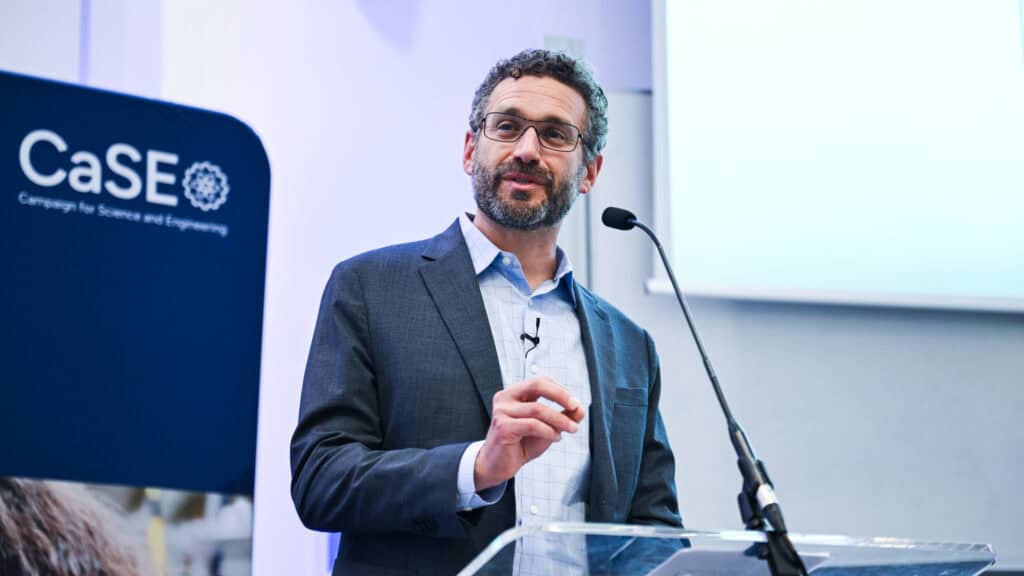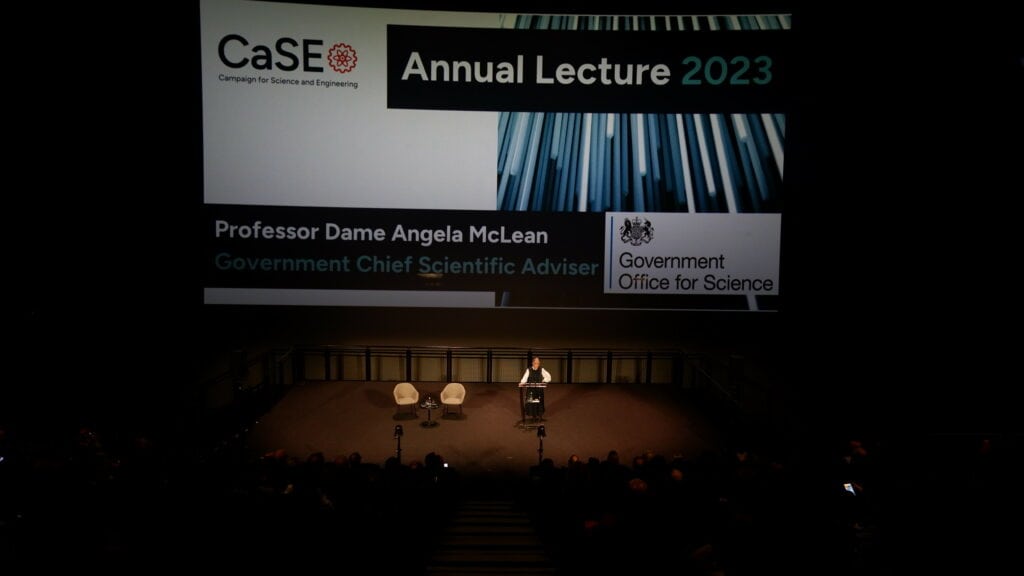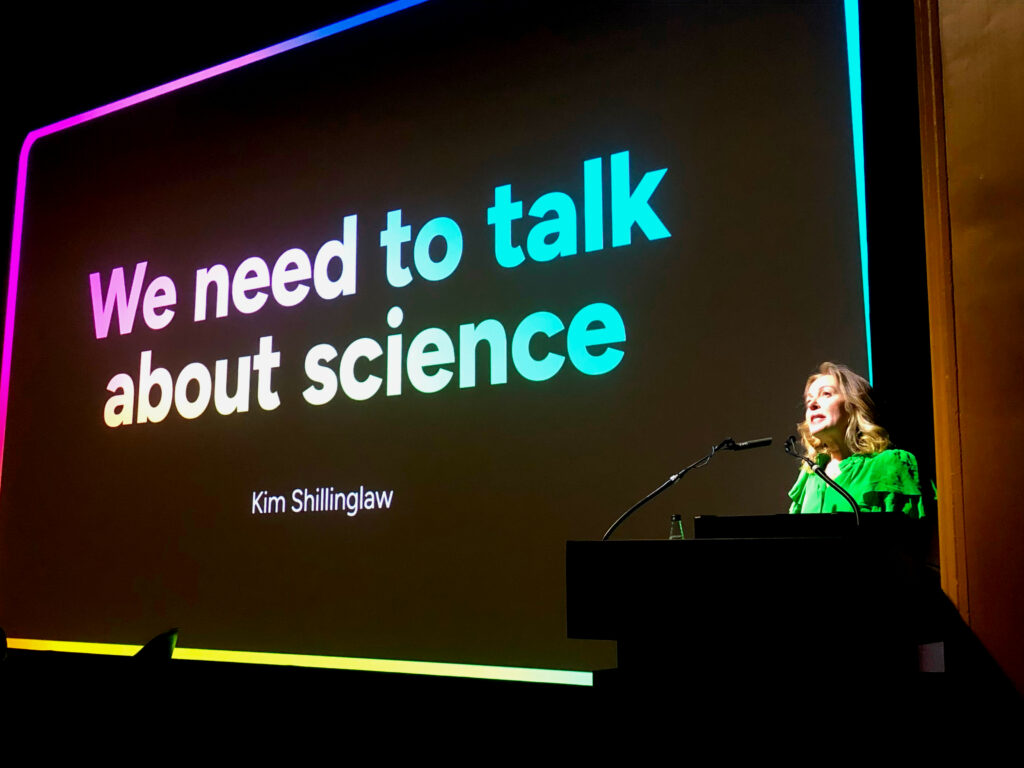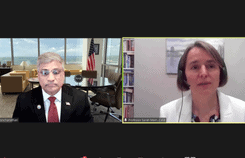On the evening of 24th November over 200 guests arrived at the Institution of Engineering and Technology on London’s Embankment for the CaSE Annual Lecture, given by Hilary Benn MP. The invited audience were eager to hear the Brexit Committee Chair’s insights on the ramifications of Brexit, and how our science and engineering endeavours can contribute to Britain’s future.
Britain’s Place in the World
29 Nov 2017
Nick Winser, President of the IET, opened the lecture by highlighting the long and fruitful partnership that the IET and CaSE have enjoyed. He also paid credit to the timely nature of the lecture topic, given the high stakes of the UK’s negotiations with the EU. CaSE Director Dr Sarah Main then took to the stage to introduce Hilary Benn MP, but not before giving a profound thanks to the IET for hosting the lecture, Elseveir as the key sponsor of the event, and to all of the individual and organisational members who make CaSE’s work possible.
Hilary Benn began his address by paying tribute to CaSE, saying that CaSE punches above its weight and is a well-respected source of information and advice within the halls of Westminster. Benn said that the work that science and engineering has carried out has shaped the world that we live in. The ways in which scientists and engineers think has been vital in this, Benn added, as the community thinks rationally and with a basis of evidence, but also think with inquiry to drive technological advancements.
Benn posited that in a modern age where people seek certainty, the only certainty is that the current environment remains very uncertain. As society is yet to get to grips with the power of the social media boom, or how complex algorithms make decisions, it has given power to those who seek to implement their ‘populist’ views who thrive in these uncertain times.
Benn proclaimed that he was a passionate ‘remainer’, because the European Union has achieved remarkable things, not least in getting previously waring countries to work together following the Second World War.

Although the result of last year’s referendum was hard to take for many, the principles of democracy dictate that the result of a vote must be respected and upheld. He believed that the vote to leave the EU was about many things, including austerity, change, loss of sovereignty, but above all else was a search for greater control. The UK must acknowledge that the referendum was a vote to leave EU institutions, Benn said, but no decision has been made on the future of the UK’s relationship with the 27 countries within the EU, and it was not a vote to abandon collaborations with science & engineering peers and institutions. Benn called on those across the political spectrum, with the help of the scientific community, that now is the time to shape the nature of the UK’s future relationship with countries across the world.
Focusing on the impact that Brexit could have on science & engineering, Benn talked about problems that the UK may face with continuing to promote the international nature of research. He told of the anxiety being felt by those who have already chosen to make the UK their home, and that continuing to attract people to work and live in the UK is vital for future prosperity. Benn also spoke of evidence that research which has been conducted in an internationally collaborative way was some of the pieces of highest quality work. The UK must ensure that a future immigration system allows UK workers to go and work in the EU and vice versa, Benn continued, and a future system should make it easier to recruit those with desirable skill sets. He noted that currently, a high salary threshold attached to a visa system would not suit the needs of the science & engineering sector, whilst saying that the UK should do everything in its power to remain part of the Erasmus student exchange programme.

In terms of European funding programmes, Benn felt it was vital that the UK should remain a part of Horizon 2020 and its successor programmes. He noted, however, that even with the UK’s participation in these programmes, investment in R&D still lagged behind competitors in Europe and beyond, and the Government must seek to address this shortcoming.
Benn was also concerned over the future of the regulatory environment in the UK, as well as the UK’s participation in EU regulatory bodies. Using the example of the European Medicines Agency (EMA) this week moving to Amsterdam from London, he stated his worries over whether the UK could remain to have a say in such organisations, or would simply align with decisions outside of the UK’s control to ensure that trade and partnerships were still available between UK and EU business.
Benn lamented the position that some Government ministers take on the Brexit deal, that no deal is an acceptable outcome, strongly believing that no deal is the worst possible deal for the citizens of the UK. He proposed the need for a transitional agreement to avoid the much maligned ‘cliff-edge’, but also said that the nature of the transition period must be formalised is needed immediately.
He said that the UK became one of the worlds most successful countries because we engaged with others, and the UK has been shaped by how we looked beyond our shores. Benn went on to say that the UK gained influence through leading developments in global initiatives, and that enabling social and economic prosperity could be achieved through global cooperation.
Benn finished by saying that the UK’s influence and its place in the world will be determined by the relationships that the UK forms with others. Of all of these, he said that the relationships forged across science and engineering will be at the fore of future prosperity for the UK, by solving the world’s great problems and challenges. Initiating the Q&A session, Sarah asked how the priorities and concerns of science and engineering are being heard in Westminster. In response, Benn said that the community must not be backward about coming forward, this is the opportunity to be heard.

Stephen Curry, of Imperial College, asked Benn about the likelihood that the UK could remain a part of Horizon 2020 and other European Research Council funding. In response, Benn said he didn’t believe that participation in Horizon 2020 was explicitly linked to be part of the single market or part of a free movement agreement, and reiterated his desire for the UK to stay a part of European funding programmes.
Lord Rooker, asked Benn if he thought that the conditions to which the final Brexit deal holds, should be put back to the public. In response, Benn said that there would be a difficulty in having another referendum, but the Houses of Commons and Lords have a responsibility to find a means to making sure that parliament has a meaningful vote on a final Brexit deal.
Andrew McKenzie of the Physiological Society, asked if Benn thought that Britain outside of the EU could be as successful as Britain inside the EU, or was it just a matter of damage limitation from Brexit. Benn said that a colleague had likened the UK’s position in Brexit to rescuing the valuables from a burning building, and said that by relinquishing our membership of the EU, the UK will lose one of its most powerful outlets.
In a final question, Sarah asked Benn, if he was sitting in this position in two years’ time, what he would like to see has been formalised with regards to Brexit. Benn wished that a financial settlement will have been finalised, some form of transitional arrangement will have been agreed, and that there will be a written agreement between the UK and the EU outlining the future relationship between them.
Wrapping up, CaSE chair Professor Graeme Reid thanked the speaker and attendees for such a lively and stimulating event.
The evening was concluded with a drinks reception. You can watch a video of the lecture and read the transcript, as well as view photos from the event, and follow social media coverage from the night #caselecture17 .
Related resources

CaSE’s 2024 Annual Lecture was given by Ilan Gur, CEO of the Advanced Research and Invention Agency (ARIA) on December 12th.

The 2023 CaSE Annual Lecture was given by Prof Dame Angela McLean.

CaSE’s 2022 Annual Lecture, given by Kim Shillinglaw, explored how the UK can forge a deeper and broader public connection with research and innovation.

Read our write-up from the CaSE Annual Lecture 2021 given by the Director of the National Science Foundation, Dr Sethuraman Panchanathan.